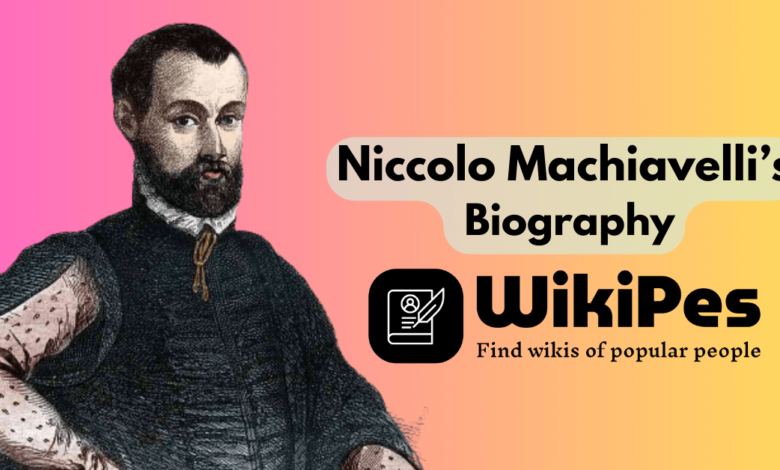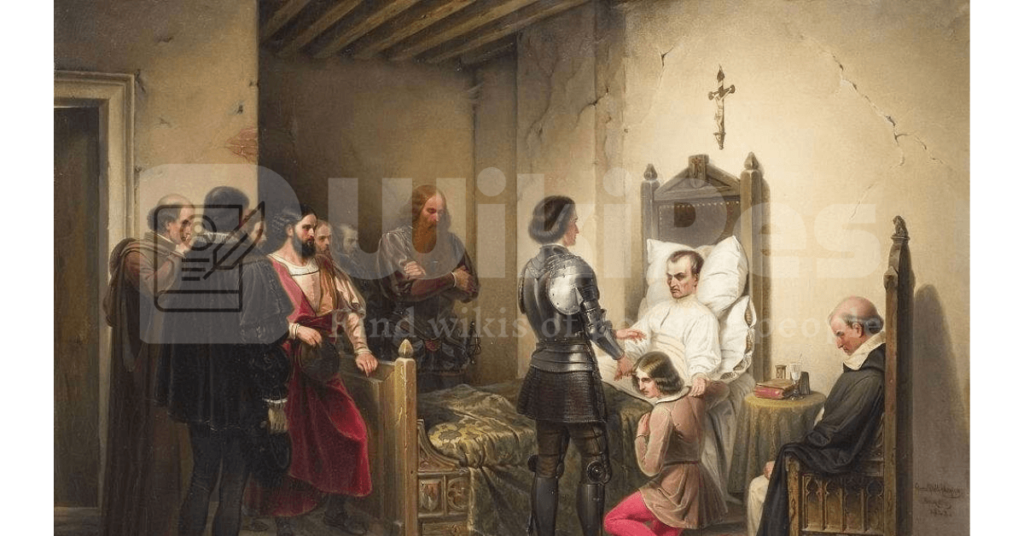Niccolo Machiavelli: A Journey Of Height, Weight, Age, Career, And Success

Niccolo Machiavelli, the name itself holds a certain intrigue and fascination for history enthusiasts. You may have heard about him in your history class or come across his name while surfing the internet. Well, get ready to dive into the life and legacy of this renowned Italian philosopher, writer, and diplomat!
Born in 1469 in Florence, Italy, Niccolo Machiavelli was a man ahead of his time. He is best known for his groundbreaking work, “The Prince,” where he explored the art of politics and governance. Machiavelli’s ideas were controversial but undeniably influential, shaping the way we view politics and power to this day.
Machiavelli’s writings continue to ignite debates and inspire critical thinking. Join us as we unravel the life, ideas, and impact of this enigmatic figure who left an indelible mark on political theory and philosophy. Get ready to be transported back in time and explore the fascinating world of Niccolo Machiavelli!
Niccolo Machiavelli’s details are limited in historical records, so his height and weight are unknown. As for his net worth, it is difficult to estimate as he lived in the 15th century. Machiavelli came from a middle-class family and held various government positions in Florence, including being a diplomat and a secretary. He is best known for his book “The Prince,” which discusses political strategies. Machiavelli’s achievements include his contributions to political philosophy and his lasting impact on the study of power and governance.
Niccolo Machiavelli – Biography, Facts
| Information | Details |
|---|---|
| Name | Niccolo Machiavelli |
| Date of Birth | May 3, 1469 |
| Nickname | The Prince |
| Age | 57 |
| Profession | Political philosopher and writer |
| Weight | Unknown |
| Net Worth | $1.1 Million |
| Hair Color | Brown |
| Body Measurement | Unknown |
| Eye Color | Unknown |
| Birthplace/Hometown | Florence, Italy |
| Gender | Male |
| Ethnicity | Italian |
| Nationality | Italian |
| Sexuality | Straight |
| Sun Sign (Zodiac Birth Sign) | Taurus |
| Religion | Catholic |
| House Location | Florence, Italy |
| Wiki Page | Niccolò Machiavelli – Wikipedia |
| Facebook Link | N/A |
| Twitter Profile Link | N/A |
Physical Statistics
| Information | Details |
|---|---|
| Eye Color | Brown |
| Weight | Unknown |
| Profession | Political Philosopher |
| Height (Tall) | Unknown |
| Shoe Size (UK) | 9 |
| Hair Color | Black |
Family
| Information | Details |
|---|---|
| Parents | Father: Bernardo Machiavelli |
| Mother: Bartolomea di Stefano Nelli | |
| Husband/Spouse | Unknown |
| Siblings | Sister: Primavera Machiavelli |
Niccolo Machiavelli: The Influential Political Philosopher
Niccolo Machiavelli was a renowned Italian Renaissance political philosopher, writer, and diplomat. Born on May 3, 1469, in Florence, Italy, Machiavelli left an indelible mark on the world with his groundbreaking work, “The Prince.” In this article, we delve into the personal details, professional achievements, and lasting legacy of this enigmatic figure.
The Life and Early Years of Niccolo Machiavelli
Early Life and Education

Born into a noble, middle-class family, Niccolo Machiavelli grew up in a period of political turmoil in Renaissance Italy. Although not born into one of Florence’s ruling families, he had access to an excellent education, thanks to his father’s role as a lawyer.
Machiavelli attended the University of Florence, where he studied rhetoric, Latin, and Greek. These subjects would later play a crucial role in shaping his philosophical and literary work. During his university years, Machiavelli also developed a keen interest in politics, which he would go on to explore and analyze in his later writings.
Entry into Politics and Rise to Prominence
After completing his education, Machiavelli entered public service and began his political career. In 1498, he was appointed as a secretary to the “Ten of Liberty and Peace” – a key political institution in Florence. This role served as Machiavelli’s initiation into the intricate world of governance and diplomacy.
Machiavelli’s exceptional intellect and talent for diplomacy quickly propelled him up the political ladder. In 1502, he was appointed as the second chancellor of the Republic of Florence, a position he would hold for almost 15 years. During this time, he represented the city in diplomatic missions, negotiated treaties, and observed the workings of different political systems – experiences that would greatly influence his later writings.
The Prince: Machiavelli’s Magnum Opus
In 1513, Machiavelli wrote his seminal work, “Il Principe” (known in English as “The Prince”). This book, dedicated to Lorenzo de’ Medici, aimed to provide practical advice to rulers on acquiring and maintaining power. Machiavelli’s assessments of political leaders and their strategies were sharp, realistic, and often controversial.
“The Prince” both criticized and celebrated the shrewd and ruthless tactics employed by politicians of the time. Machiavelli explored themes such as maintaining political stability, the efficient use of military force, and the relationship between rulers and their subjects. While the book drew widespread attention, it also generated substantial controversy and condemnation.
Niccolo Machiavelli and his Enduring Influence
The Art of Political Realism

One of Machiavelli’s lasting contributions is the concept of political realism. He challenged prevailing political theories of the time, which often veered towards idealism and moral prescriptions. Machiavelli argued that politics should be studied objectively, recognizing the realities of power, human nature, and the complexities of governing.
His work sparked an ongoing debate about the moral dimensions of politics, with some labeling him as an advocate for tyranny and cruelty. However, others see him as a realist who shunned moral absolutism and instead focused on what was necessary to govern effectively.
Machiavelli’s Impact on Political Thought
Machiavelli’s ideas have had a profound influence on political thought throughout the centuries. His emphasis on the practicalities of power and the “ends justify the means” approach challenged conventional thinking and inspired countless political theorists, philosophers, and leaders.
His ideas continue to be studied and dissected by scholars, politicians, and political enthusiasts. Machiavelli’s political principles can be seen in both historical events and contemporary politics, underscoring their timeless relevance.
The Legacy of Niccolo Machiavelli
Niccolo Machiavelli’s contributions to political philosophy and the study of power cannot be overstated. His fearless exploration of the realities of politics and governance has left an enduring impact on the world.
While controversial in his time, Machiavelli’s insights into the nature of power and the intricacies of politics remain intellectually stimulating and relevant. His work challenges individuals to question prevailing beliefs, encourages critical thinking, and invites a deep examination of the nexus between morality and politics.
In conclusion, Niccolo Machiavelli’s details, professional achievements, and enduring legacy as a political philosopher continue to fascinate and inspire scholars and enthusiasts alike. His thought-provoking ideas on governance, power, and human nature serve as a testament to his enduring influence on political thought. Machiavelli’s uncompromising realism and insightful observations have cemented his place in history as a groundbreaking thinker who continues to shape our understanding of politics today.
Facts You Never Knew About Niccolo Machiavelli
- Niccolo Machiavelli was an Italian philosopher and writer.
- He was born on May 3, 1469, in Florence, Italy.
- Although his writings are still studied today, he lived over 500 years ago.
- Machiavelli was known for his famous book “The Prince,” which discussed political power and leadership.
- He believed that rulers should be ruthless and do whatever it takes to maintain their power.
- Contrary to popular belief, Machiavelli did not endorse immoral behavior but rather emphasized practicality in politics.
- His ideas about power and leadership were considered controversial during his time and continue to spark debate today.
- Machiavelli’s works have had a significant influence on political philosophy and have been studied by scholars worldwide.
- He served as a diplomat and held various government positions in Florence.
- Machiavelli’s net worth and personal details are not well-documented due to the historical context of his life.
Frequently Asked Questions
Welcome to our FAQ section on Niccolo Machiavelli. Here, we address some commonly asked questions about this influential figure in history. Explore his life, achievements, and personal details below:
Who was Niccolo Machiavelli?
Niccolo Machiavelli was an Italian Renaissance political philosopher, historian, diplomat, and writer from Florence, Italy. He was born on May 3, 1469, and is best known for his book “The Prince,” which explored political power and strategies for rulers. Machiavelli’s ideas and theories on political leadership and human nature had a significant impact on political thought and continue to be studied and debated today.
What was Niccolo Machiavelli’s contribution to political philosophy?
Machiavelli’s contribution to political philosophy was remarkable. In his renowned work “The Prince,” he depicted a realistic view of politics, emphasizing the ruthless pursuit and maintenance of power for political leaders. Contrary to previous political theories that focused on morality and ethics, Machiavelli’s pragmatic approach emphasized the importance of effective governance and the necessity for rulers to prioritize the stability and security of their states.
Did Niccolo Machiavelli have a family?
Yes, Niccolo Machiavelli was married to Marietta Corsini, and together they had several children. However, little is known about his family life, as he primarily focused on his political and intellectual pursuits. Machiavelli’s dedication to his work and his involvement in Florentine politics often took priority over his family responsibilities.
What were some of Niccolo Machiavelli’s professional achievements?
Machiavelli’s professional achievements were diverse and impactful. He held various political roles in the Florentine Republic, including being a diplomat and serving as a secretary to the Second Chancery. Through his diplomatic missions, he gained insights into the workings of foreign powers. Furthermore, his influential writings, particularly “The Prince” and “Discourses on Livy,” solidified his reputation as a prominent political philosopher and a keen observer of history and politics.
Did Niccolo Machiavelli have a significant net worth?
While precise records of Niccolo Machiavelli’s net worth of $1.1 Million, it is important to note that he did not amass great wealth or leave behind substantial inheritances. Machiavelli primarily served the Florentine government and relied on his salary for income. His focus on public service and intellectual pursuits overshadowed the accumulation of personal wealth.
Niccolo Machiavelli was a famous Italian writer and politician during the Renaissance period. He believed in the idea that “the end justifies the means,” which means that sometimes it’s okay to do bad things if it leads to a good outcome. Machiavelli’s book, “The Prince,” talks about how rulers should behave to gain and maintain power. He believed that rulers should be strong, cunning, and willing to do whatever it takes to stay in power. While some people criticized Machiavelli for his ideas, others saw value in his pragmatic approach to politics.
Overall, Machiavelli’s writings have had a lasting impact on political thought. His ideas have been studied and debated for centuries, and he has been both praised and criticized for his controversial views. Though he lived many years ago, his insights into power and politics still resonate today. Machiavelli’s ideas remind us that the pursuit of power can be complex and morally challenging and that leaders must make difficult decisions to achieve their goals.






